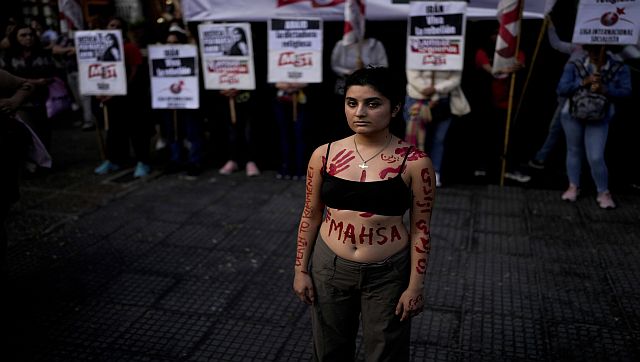Unrest continues to erupt across Iran following the death of a 22-year-old Kurdish Iranian woman, who died after being arrested and reportedly beaten by
Iran’s morality police. The Iranian force took Mahsa (Zhina) Amini into detention on 16 September 2022, for not wearing her hijab according to the rules. As of 26 September,
at least 41 people have been confirmed killed and hundreds have been
arrested and wounded in protests that erupted after Amini’s death. With the exception of bland condemnations, the discrimination against women in Iran is often overlooked while the world focuses on
limiting the country’s nuclear capabilities.
Some scholars and activists have criticised international law for its lack of initiative and public action in recognising Iran’s systematic discrimination against women as gender apartheid and acting to prevent it. But many discriminatory laws, including those forcing women to cover their head and face with a hijab,
honour neither tradition nor religion and are applied to women of all ethnicities and faiths. After all, Amini was not a Shiite woman by ethnicity or religion. Iran’s gender apartheid The
1979 Islamic Revolution established a republic that implements similar inhumane policies and practices of racial segregation and discrimination as practised in
South Africa under the government’s former brutal apartheid regime. The laws and policies in Iran establish and maintain domination by men and the state over women and their right to choose their own clothing or obtain a divorce. Systematic gender inequalities are prescribed legally and enforced by the regime to deny the women the “
right to life and liberty” and “
basic human rights and freedoms,” which according to
Article II of the United Nations’ Apartheid Convention in 1973, are considered “the crime of apartheid.” For example, according to
Article 18 of Iran’s Passport Law, a married woman still needs written permission from her male guardian to travel abroad. Women in Iran are unable to hold any positions within the judicial, religious and military systems, nor are they able to serve as members of the
Assembly of Experts, the
Expediency Discernment Council or the
Guardian Council, the three highest councils in the Islamic Republic. Women under law cannot be president or supreme leader of Iran.
According to Article 115, the president of the Islamic Republic must be elected from among the “religious and political men.” In addition, the Iranian state
has added discriminatory features to the criminal code – one such feature is the principle that the value of a woman is one-half of the value of a man. That principle applies in matters involving compensation for a killing and in what a son or daughter receives from a family inheritance. They also apply to the weight given to legal testimony or in obtaining a divorce. Such laws, policies and practices continue to mark women as lesser citizens, legally and socially unequal. Segregation in daily life The state also has imposed
systematic segregation in schools, hospitals, universities, transportation, sports and other major areas of day-to-day life. For many decades, Iran’s gender apartheid had relegated women to the back of the bus with
a metal bar segregating them from men. Under the government’s direction, universities
have set limits on women’s options and have banned them from many fields of study. Iran has
generally barred female spectators from soccer and other sports stadiums since the 1979 revolution. Clerics play a major role in decision-making and
have argued that women must be shielded from the masculine atmosphere and sight of semi-clad men during sporting events. Under such discriminatory policies, the Persian terms such as za’ifeh, meaning weak and incapable, has found its way into
Persian dictionaries as synonyms for “woman” and “wife.” ‘Women, life, freedom’ Iran’s notorious extrajudicial morality police
have terrorised women for decades. Like the articles of the
Constitution of the Islamic Republic of Iran, principles of the morality police are founded on an interpretation of
canonical Shiite texts and are implemented through modern tools of control and prosecution. In international criminal law, specific unlawful acts that are committed within a system of oppression and domination are considered crimes against humanity. As set out in the UN‘s
Apartheid Convention, these crimes include denial of basic rights that prevent a racial group or groups from participating in the political, social, economic and cultural life of the country. Most known for the brutal regime in South Africa, apartheid comes from the Afrikaans word meaning “apartness.” It
was the ideology that was introduced in South Africa in 1948 and supported by the National Party government. The compulsory hijab is at the centre of what I call Iran’s extreme gender apartheid, where a misplaced headscarf can result in up to
15 years in prison,
lashing,
fines and inhumane and unlawful arrest and death. Several
anti-compulsory hijab movements emerge every few years in Iran, such as in the case of Zhina Amini. In the Kurdish language, her name originates from “jin,” the word for woman and shares a root with the word for life, “jiyan.” Those Kurdish words are at the heart of the most used slogan by the
Kurdish Female Fighters against the Islamic State in Iraq and Syria, and by women across Iran today against the Islamic Republic of Iran. Add in “azadi” — the Kurdish word for freedom — and the slogan “Jin, Jiyan, Azadi” means “Women, Life, Freedom” and is resounding among protesters in streets throughout Iran and the world to dismantle the state’s gender apartheid. This article is republished from
The Conversation under a Creative Commons license. Read the
original article. Read all the Latest News , Trending News , Cricket News , Bollywood News , India News and Entertainment News here. Follow us on
Facebook,
Twitter and
Instagram.
Since the 1979 Revolution, systematic gender inequalities are prescribed legally and enforced by the Iranian regime to deny the women the ‘right to life and liberty’ and ‘basic human rights and freedoms’
Advertisement
End of Article


)

)
)
)
)
)
)
)
)



